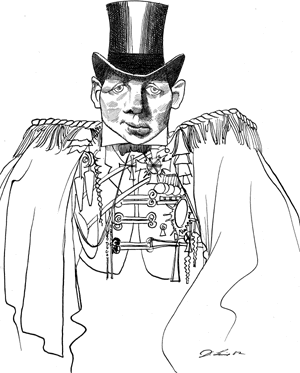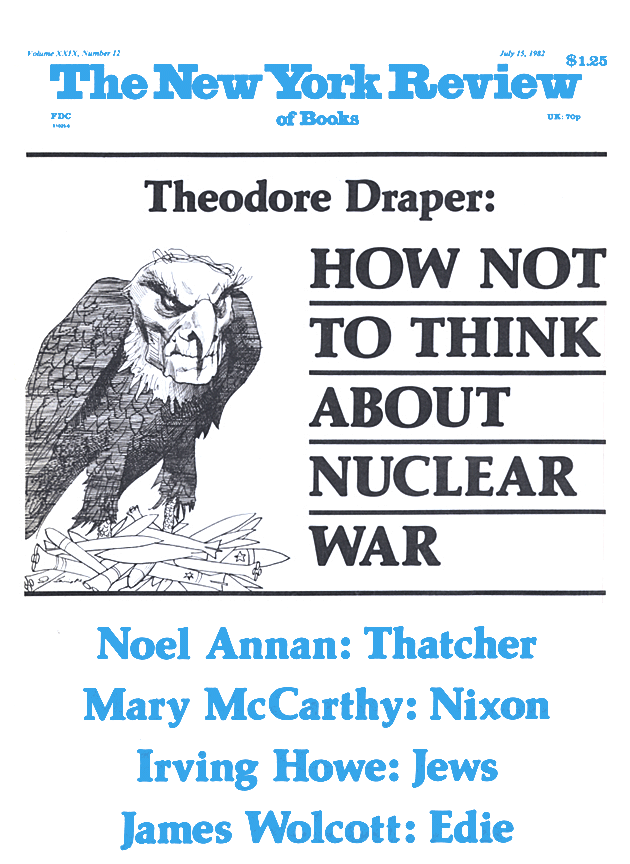Most men are content with one career. Winson Churchill had half a dozen. Time and again he mastered a different field of politics and rose to a great height. On every occasion except the last his career ended in failure and even on the last occasion he was not sure that he had succeeded. If Churchill had died before the outbreak of the Second World War he would have been written off as a failure—a splendid failure no doubt, but a failure all the same. Churchill’s career is fascinating in its achievements and in its setbacks. How did he impress the shrewdest politicians simply by the impact of his personality? And how did he emerge from failure with his reputation undimmed? Was it the sheer impudence of his pretensions—a young man, as Ted Morgan writes, in a hurry?
Morgan’s book covers Churchill’s first successes when he rose to become a member of the Liberal Cabinet and ends with his first great fall, which followed the failure of the Dardanelles campaign in 1915. This ground has of course been covered already by the “official” biography of Churchill by Randolph Churchill and Martin Gilbert. Their work consists of ten volumes—three of text and seven of documents—to Morgan’s one. What is more, much of Morgan’s book is drawn from the documents published in the larger work. The reader who has struggled through the ten volumes of Randolph Churchill and Martin Gilbert will find few surprises in the single volume by Ted Morgan, but I doubt whether this is a highly numerous group.
Morgan is the more entertaining, perhaps too much so. For instance, he is fascinated by the private life of Asquith, the Liberal prime minister: a prime minister often overcome by drink who spent his time in Cabinet writing letters to his girl friend. These stories are a little overdone. Asquith was getting on in years and had to handle great political crises. No doubt he often fell asleep in the House of Commons, as many sensible members do, and no doubt he often stumbled as he left the House. If he had made a habit of being drunk there would have been a political scandal, or is the explanation that too many members of parliament were drunk to cause any sensation when the prime minister joined their number?
As to the girl friend, in those days elderly statesmen often had innocent flirtations in the hope of recapturing their youth. Churchill was one of the very few British statesmen who never cared for any woman except his wife. This, he claimed, was why he had so much more time than his colleagues to get on with his political work or, when out of office, to write books about his achievements. This he did for instance with the First World War, about which Balfour said, “Winston has written a book about himself and called it ‘The World Crisis.’ ”
The key to Churchill’s career, both in success and failure, is clearly revealed by Morgan. It was simply that from an early age he had supreme faith in himself. Winston Churchill began discouragingly with a father, Randolph Churchill, who thought that he was no good. At this most boys would have lost heart. Winston did the opposite. He developed an arrogant self-confidence, at first quite unjustified, and then carrying him irresistibly forward. More than this, he executed an unusual revenge by writing a biography of Randolph Churchill in which he depicted his father, by then dead of syphilis, as a political genius of the first water. This idea was so forcibly expressed that even Randolph’s friends came to believe it. The legend about Winston’s father helped Winston himself to rise high and quickly.
When Churchill had been in Parliament for only three years he switched from the Conservative to the Liberal Party, ostensibly over tariff policy, a topic that Churchill did not understand. If any other member of Parliament had switched after being in Parliament for only three years, it would have been a black mark against him. Winston Churchill acquired new merit for his courage. It is fascinating to watch how experienced politicians discovered new qualities in Churchill with every daring step he took. On top of this, his life of his father appeared just at the right time, when, like his father, he had broken with the Conservative Party.
One may add a further point. The second Randolph Churchill, Winston’s son, also revealed new qualities in both his father and his grandfather when he came to write his father’s biography. There is no limit to the way in which students of Winston Churchill have been mesmerized into admiration. Ted Morgan makes some attempts to escape the spell. He rarely succeeds.
Advertisement
Winston Churchill’s political career started seriously with the formation of the Liberal government of 1905 and its subsequent great victory in the general election. The elderly Liberal prime minister, Sir Henry Campbell-Banner-man, was by no means an admirer of the Churchills, father or son. Nevertheless he gave the younger Churchill quite a considerable post for a beginner: under secretary at the Colonial Office. Churchill at once claimed considerable experience in British colonial affairs as a result of a short involvement in the Boer War.
More than this, he brushed aside Lord Elgin, the colonial secretary, as an aging and tired man. Elgin was a Liberal of high seniority but he got little support or sympathy from the prime minister and gave up altogether when the Cabinet was reshuffled on Campbell-Bannerman’s death. Asquith, the new prime minister, had been a friend of Randolph Churchill’s; his daughter Violet was a friend of Winston’s. Winston made the most of both friendships. At least it is difficult to think of any other explanation why Asquith should appoint Winston Churchill home secretary, a sphere in which Winston was wholly inexperienced. However he is reported to have been a success at the job, at any rate to the extent of reforming the British prison system after seeing a play by John Galsworthy.
A more significant feature in Churchill’s career was his move toward the radical wing of the Liberal Party. This brought him into close contact with Lloyd George, a Radical of longer activity and with a social origin entirely different from Churchill’s. Winston Churchill was the grandson of a duke, Lloyd George the nephew of a cobbler. Despite this they worked together, bringing into existence the first elements of what came to be called the welfare state. In 1909 they also worked together to oppose the increase in expenditure on the Royal Navy, an episode that Randolph Churchill entirely omits from his biography. Was he ashamed that his father took this line or did he regret that the resistance failed? In any case a curious omission.
Lloyd George and Churchill became “The Heavenly Twins,” the outstanding figures of the new Liberalism. Lloyd George had a coherent political outlook, Churchill was an opportunist. There is no doubt that Churchill was always in awe of Lloyd George—as late as the Second World War. Lloyd George found great stimulus in Churchill’s company but added considerable caution as well. As a result their friendship ran up and down.
Churchill’s career took a new turn when there was an alarm of a war against Germany and serious doubt whether the British armed forces were adequately prepared for the possible conflict. There had been no coordination between army and navy. The War Office planned to send an expeditionary force to northern France in case of war. The Admiralty had made no preparations to protect the army as it crossed the English Channel. Instead the Admiralty planned operations of its own, perhaps in the Baltic, perhaps against the German coast. A resolute minister was needed to drum some sense into the admirals. And who was this political genius who was to reorganize the Admiralty, impose a new strategy, and put the Royal Navy on a war footing? None other than Winston Churchill. His appointment as first lord of the Admiralty was a decisive step in his career. It asserted his qualifications as a potential war leader. It put him very much in the public eye when war came. His achievements at the Admiralty between 1911 and 1914 have rarely been questioned.
Yet it was surely an odd appointment. Churchill knew nothing about the Admiralty or naval affairs except the pleasure of cruising in the Admiralty yacht Enchantress. He knew little or nothing about the individual admirals except for Sir John Fisher, who was now in retirement and much over age into the bargain. There is a legend, alive to this day, that Churchill had prepared the Royal Navy to perfection. Kitchener, who had usually a low opinion of Churchill, said in his praise, “The Navy was ready.” Most of those who write about Churchill or the navy take the same view.
Ted Morgan cannot make up his mind. He writes of Churchill’s work with the Royal Navy as shown in the test of war in 1914, “He had honed the Navy’s cutting edge to razor sharpness, and now the great cutlass was poised to strike.” A few lines later Morgan goes on to show that the Royal Navy was deficient in almost every particular—no efficient mines, no up-to-date minelayers, very few firing directors. One could prolong the catalogue indefinitely. The late Arthur Marder, historian of the Royal Navy from the Dreadnought to Scapa Flow, has shown that the British ships were inferior to the Germans at almost every point and that the Royal Navy was not effectively reformed until after the battle of Jutland. Churchill’s main contribution to the Royal Navy at war was to bring back Fisher as first sea lord, not a happy appointment.
Advertisement
It would be very wrong to lay on Churchill all the blame for the catastrophic failure at the Dardanelles. He did not initiate the campaign, he did not direct its supply. But he staked his reputation on it. Perhaps it would be fairer to say that he was the victim of circumstance. The British government sheltered behind Kitchener, who had far greater responsibility for initiating the campaign and for its failure. Obviously Kitchener had to be preserved. Churchill could safely be blamed. Indeed his dismissal would make Asquith’s government more popular or rather less unpopular, which is not quite the same thing. In May 1915 Churchill left the Admiralty; in November he left office altogether. His first career was over. Churchill made this comment on his service as a minister in wartime. “This, this is living history. Everything we are doing and saying is thrilling—it will be read by a thousand generations, think of that. Why I would not be out of this glorious delicious war for anything the world would give me.” Later he withdrew the word “delicious,” adding “You know what I mean.”
This Issue
July 15, 1982



